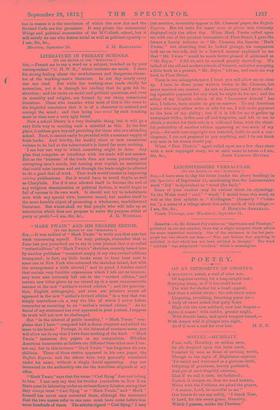LITERATURE IN PRIMARY SCHOOLS.
[TO TER EDITOR OF THE "SPECTATOR."]
SIR, —Permit me to say a word on a subject, touched on by your correspondent "C. H. W. B.," which interests me much. I share his strong feeling about the unwholesome and dangerous charac- ter of the working-man's literature. In our day nearly every one can read. But while the working-man reads chiefly for recreation, yet it is through his reading that he gets his in- struction; and his views on social and political questions, and even on morality and religion, are formed by our cheap sensational literature. Those who examine what most of this is like come to the frightful conclusion that it is of a character to mislead and corrupt the mind ; and that being instructed by such teaching must in time rear a very ugly breed.
Now a school library is a very desirable thing, but it will go a very little way in meeting such a mischief as this. In the first place, it seldom goes beyond providing for those who are attending school. Next, it cannot easily be provided with a constant supply of fresh books. And thirdly, the weekly sheet or new sensational volume to be had at the tobacconist's is found far more exciting.
I see but one way in which something might be done. Any plan that competes or interferes with the trade will not answer. But as the ' business ' of the trade does not mean perverting and corrupting men's minds, but turning over capital, an association that could raise income and act through the trade might be allowed to do a good deal of work. That work would consist in improving existing publications. But it would have to avoid Scylla as well as Charybdis. For if it ever allowed itself to become the tool of any religious denomination or political faction, it would begin to fail of success in its own work. It should not try to indoctrinate men with any special view, however sound, but confine itself to the more humble object of promoting a wholesome, unadulterated literature. But where shall we find people who will take up an association which does not propose to serve the purpose either of
party or profit P—I am, Sir, &c., J. G. WENHAM.


































 Previous page
Previous page